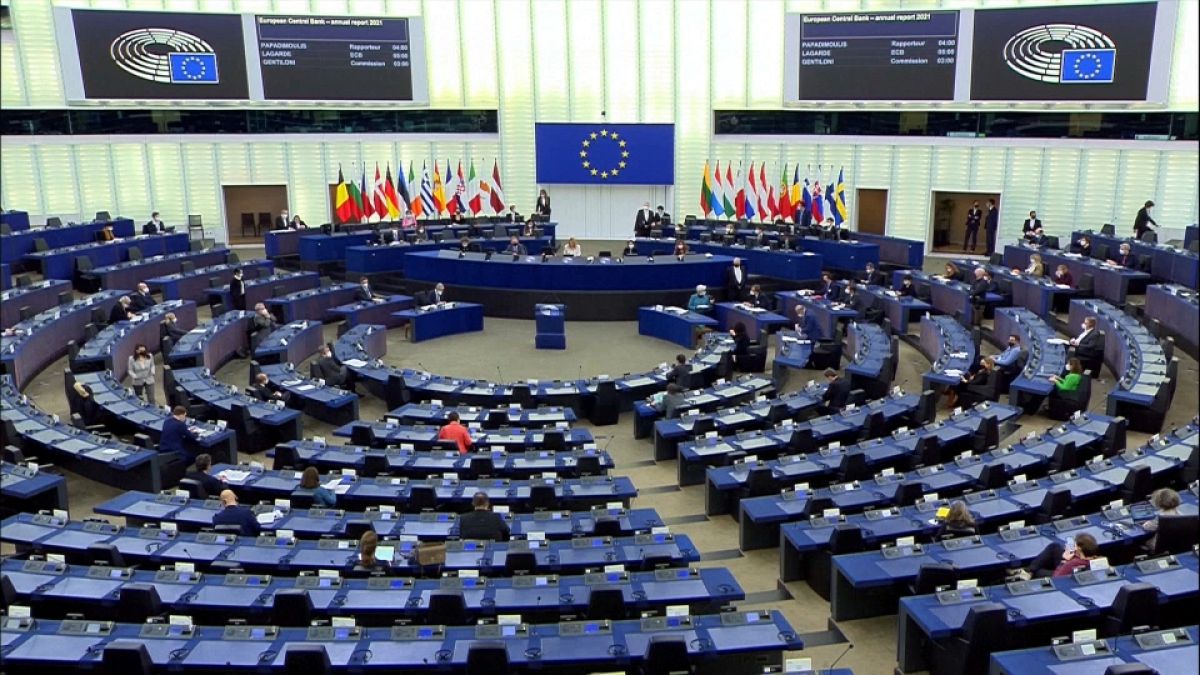Far-right and far-left groups refused to support the financial proposal, which is being fast-tracked to ensure a faster disbursement.
The European Parliament has once again stressed its support for the national sovereignty and territorial integrity of Ukraine, even if certain political groups embrace an alternative line of thinking that puts them at odds with the majority opinion.
The hemicycle agreed to fast-track a €1.2 billion emergency package of financial assistance for Kyiv with 598 votes in favour. A final vote is expected later this week in Strasbourg.
The European Commission wants to send Ukraine €600 million as soon as possible, in the form of long-term loans with favourable conditions, to mitigate the disruption caused by the border standoff with Russia. Member states have already backed the proposal.
But the final tally revealed cracks on the consensus: 53 MEPs voted against the financial aid while 43 lawmakers chose to abstain.
"There are different sensitivities [among MEPs] that have to do with the territory, with the country, with the situation as well as with how economic sanctions will affect certain sectors," said Iratxe García, leader of the socialist group (S&D), who added "sanctions will be on the table" in the event of an invasion.
'Time to get out of NATO'
Most of the dissidents on Monday's vote came from the far-right Identity and Democracy (ID) group, which often advocates a softer line on Russia, and The Left, which traditionally espouses a non-aligned position in regard to NATO.
"The tensions are on both sides. Clearly on one hand, Vladimir Putin is doing some sort of provocation when is sending some troops over the border. On the other hand, NATO and the US are doing some provocation when they want to extend NATO to the Russian border," Manon Aubry, a French lawmaker who co-chairs The Left, told Euronews.
"NATO was created at the time of the Cold War, at a time when the situation was completely different at the international level. It's time to get out of NATO," she added.
"It's time for the European Union to be independent."
Aubry believes that a neutrality declaration by Ukraine under the auspices of the United Nations could help resolve the ongoing border standoff, which has seen more than 100,000 Russian troops circle the former Soviet country and increased fears of a bloody, unpredictable conflict.
Putin 'wants Ukraine, not security guarantees'
But for Radosław Sikorski, a Polish MEP from the centre-right European People's Party (EPP), such a statement is not necessary because it would reflect an already existing reality.
"Ukraine is an independent, non-aligned, neutral country and there's no need to change that and there is no need to invade Ukraine for maintaining it," Sikorski told Euronews.
"If President Putin invades Ukraine, that's because he wants Ukraine, not security guarantees."
His comments were echoed by Ska Keller, co-chair of the Greens, who sees Ukraine as a "sovereign country" that must be able to make its "own decisions."
"You shouldn't be afraid of what your neighbour would say when you decide where you want to go," she said.
Moscow has repeatedly denied any intentions to carry out any military incursion, but Western officials have warned in recent days that an attack was imminent. Several countries have asked their diplomatic staff to leave Ukraine while their leaders engage in against-the-clock diplomacy.
On Tuesday, President Putin, speaking next to German Chancellor Olaf Scholz, said he did not want a war and was ready to negotiate. His comments coincided with a partial withdrawal of troops and raised the prospect of de-escalation. But scepticism and doubts over Russia's true intentions remain.
Putin is "not a man who is impressed by appeals to international law," Sikorski noted.
"We need to tell him that if he invades Ukraine, he will have a guerrilla war, which we will assist for 10 years if need be; that we will take his personal money away, hidden away by his cellist, by his cook and by his oligarchs in tax havens in Western banks," he said.
"If he wants to have an arms race, such as the one that bankrupted the Soviet Union, he might just get it."
